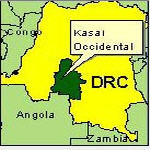In around 20 villages located within a 30 kilometer radius around Kampungu, MSF visits health structures every day.
 MSF and MSF Podcasts: Kinshasa/Brussels - Médecins Sans Frontières (MSF) has seen a decrease in the number of admissions in its isolation unit in Kampungu, a village of 9,000 inhabitants which is the epicentre of the outbreak of Ebola hemorrhagic fever in the Democratic Republic of Congo (DRC).
MSF and MSF Podcasts: Kinshasa/Brussels - Médecins Sans Frontières (MSF) has seen a decrease in the number of admissions in its isolation unit in Kampungu, a village of 9,000 inhabitants which is the epicentre of the outbreak of Ebola hemorrhagic fever in the Democratic Republic of Congo (DRC).
"Three patients, of which two have tested positive for Ebola, were admitted over the last week, the most recent one on Saturday," said Dr Michel Van Herp, MSF epidemiologist. "We are close to controlling the Ebola outbreak. But we remain vigilant as the virus is still circulating in some of the neighbouring villages. Also, as the incubation period for Ebola can be up to three weeks, there may still be infected people around who have not yet developed any symptoms."
The three patients currently followed by MSF's medical team are the latest of 32 admissions since early September. According to the World Health Organisation (WHO), 384 suspected cases have been reported since the beginning of May, including 176 deaths. Out of 53 blood samples taken, 24 tested positive to Ebola virus. Other diseases with symptoms similar to those of the first stage of Ebola are raging in this region of the central Congolese province of West Kasai: malaria, shigella, and typhoid fever.
Ebola hemorrhagic fever is an extremely contagious disease, for which there is no vaccine or cure. The Zaire-type of Ebola kills 70% to 90% of those infected. MSF's activities therefore focus on isolating infected people, rehydrating them and easing their pain - what helps some of them recover. In order to contain the outbreak, it is also important to search for other cases and to trace those who have been in contact with people suspected of being infected.
"A reduction of the disease's transmission chain was made possible by these measures and by carrying out safe burial practices," added Dr Van Herp. "And collaboration with a laboratory installed in Luebo, 16 km north of Kampungu, by the Centre for Diseases Control (CDC), now makes diagnosis possible in 24 hours."
The first MSF team arrived on September 2. Currently, 17 international specialists and about 50 Congolese colleagues have set up two isolation units in Kampungu and in Luebo. MSF is working alongside the Congolese authorities, WHO and other organisations.
In around 20 villages located within a 30 kilometer radius around Kampungu, MSF visits health structures every day. The team has trained health staff and distributed medicines and protective material. As the virus spreads easily through body fluids, those caring for the sick are at extreme risk. In addition, 35 community workers have been trained to get information about prevention across to the population.
Yet some very isolated villages remain difficult to reach, such as Tchitala and Kalombayi, where suspected Ebola cases have been recorded. MSF's logisticial team, together with the population, is rehabilitating bridges and tracks in order to make urgently needed transport of sick people to the isolation units possible.
Only selected MSF documents are posted on Reliefweb. For a complete selection of MSF news, please visit the MSF International website
Related articles
- • 'Deadly environment' plus 'political and social' obstacles hinder Ebola fight, Security Council hears (July 24, 2019)
- • Ebola outbreak declared an international Public Health Emergency (July 17, 2019)
- • DR Congo: The country that knows how to beat Ebola (December 11, 2014)
- • Ebola Epidemic Resurfaces in DR Congo's Equateur Province (August 25, 2014)
- • At least 60 killed as train derails in Katanga province (April 23, 2014)
- • Kamerhe Rejects Single Opposition Candidate Strategy (November 19, 2011)
- • Tshisekedi's Mental Health Called into Question after Incoherent Statements (November 8, 2011)
- • Congo, India to Build Hydro Plant (July 12, 2011)
- • UN high-level HIV-AIDS meeting continues with progress reports (June 9, 2011)
- • Rape study 'questionable' (May 18, 2011)
- • 2010 Human Development Report analyses long-term development trends (November 4, 2010)
- • DR Congo improves education, child survival but greater efforts needed - UN (October 6, 2010)
- • Officials Revise Death Toll from Boat Accident (July 30, 2010)
- • 138 Dead after Boat Sinks on Kasai River (July 29, 2010)
- • President Kabila Pays Respects to Sange Victims (July 5, 2010)
- • Goma: MONUC's hospital provides essential support to the mission and the FARDC (November 18, 2009)
- • WHO: DR Congo has no influenza A/H1N1 (May 28, 2009)
- • End of Ebola outbreak (February 17, 2009)
- • UN calls on rebels to resume talks with Government (January 2, 2009)
- • Archbishop Djomo elected new president of the CENCO (July 14, 2008)
- • Fight against malaria continues in the DRC (April 25, 2008)
- • Kinshasa: DRC public health workshop to pave way for the future (April 9, 2008)
- • Government announces end of Ebola outbreak (November 20, 2007)
- • United States Support to the Democratic Republic of the Congo (October 31, 2007)
- • MONUC denounces the presence of children in FARDC's ranks (October 31, 2007)
- • Monitoring of Ebola "must continue" (October 3, 2007)
- • CDC scientists travel to Democratic Republic of the Congo to fight Ebola outbreak (October 1, 2007)
- • Medics Struggle to Limit DRC Ebola Outbreak (September 21, 2007)
- • Ebola outbreak "contained" - Kabila (September 14, 2007)
- • Military Escalation Likely in DRC Say Analysts (September 14, 2007)
Tags: |







